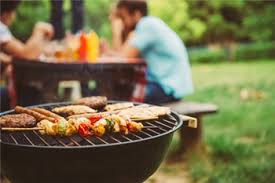Thursday 24th August marks National Burger Day in the UK, and with households across Wales planning to get grilling over the bank holiday weekend, the Food Standards Agency (FSA) is issuing top tips on how to ensure your barbecue is safe and enjoyable for all.
The FSA’s Food & You survey has indicated a gap in Welsh residents’ knowledge around food hygiene and, amongst other things, the importance of cooking meat thoroughly. It found that 9% of people in Wales said that they sometimes eat chicken or turkey even when the meat is pink or has pink or red juices.
A snapshot survey, conducted by the FSA, also highlighted that 42% of people in Wales have been served undercooked meat at a barbecue, potentially contributing to the 1 million cases of food poisoning in the UK every year. The survey also found that, despite nearly a third of Welsh residents (32%) saying they worry about food hygiene at barbecues, many admit failing to check the meat in the correct way before serving it: 58% don’t check there is no pink meat inside; 60% don’t check that the juices run clear; and 86% don’t check that the meat is steaming hot.
55% people in Wales expected to attend or host a barbecue this year, and cases of food poisoning from Campylobacter, E. coli, Listeria and Salmonella rise in the summer months. A rare beef burger, for example, is three times more likely to contain harmful E. coli bacteria than a well-cooked burger, which is why burgers should be thoroughly cooked at home, until steaming hot all the way through.
To help ease concerns, the FSA has issued the following tips as part of its ‘Safe Summer Food’ activity to help everyone in Wales enjoy their summer barbecues without worry:
Pre-cook. Consider cooking all chicken and pork in the oven prior to giving it a final ‘finish’ on your barbecue where possible. Your friends and family will still experience that special barbecue ‘chargrilled’ taste – and you will know that you’ve cooked the chicken all the way through. This technique can also be used for sausages, burgers and kebabs if you’re cooking for large numbers.
Charred on the outside doesn’t always mean cooked on the inside. Cut open and check your burgers, sausages and chicken. Turning meat regularly and moving it around on the barbecue will also help to cook it evenly. If in doubt, keep cooking. Remember that most types of meat are safe to eat only when:
the meat is steaming hot throughout
there is no pink meat visible when you cut into the thickest part
any juices run clear
Remember disposable barbecues take longer to heat up and to cook food. Don’t overload the barbecue and always check that your meat is cooked thoroughly.
Avoid cross-contamination by storing raw meat separately before cooking. Use different utensils, plates and chopping boards for raw and cooked food. Always wash your hands thoroughly with soap and water and dry them before and after handling food.
Keep plates and cutlery away from raw meat and fish. And never reuse a marinade used on raw meat, unless you give it a thorough cook first. You’ll only be serving up bugs along with that extra flavour to your guests.
Keep cold foods below 5°C and hot foods above 63°C. And don’t leave food that you would store refrigerated standing around in the warm before serving.
Heather Hancock, Chair of the FSA Board said:
“When you’re at a barbecue, remember that most types of meat should be cooked thoroughly to prevent food poisoning. A beef burger, for example, isn’t like a steak – it has bacteria present throughout. To make it safe to eat when prepared at home, it must be cooked through. Some restaurants are able to offer their customers burgers less than thoroughly cooked, but only because they have strict controls in place that are regulated and checked by enforcement officers.”
For more information visit: https://www.food.gov.uk/safe-summer-food. 0544_FSA-Summer17_Infographic_FINAL[1]
Help keep news FREE for our readers
Supporting your local community newspaper/online news outlet is crucial now more than ever. If you believe in independent journalism, then consider making a valuable contribution by making a one-time or monthly donation. We operate in rural areas where providing unbiased news can be challenging. Read More About Supporting The West Wales Chronicle



























